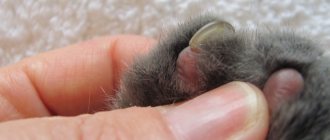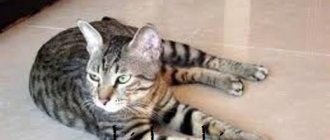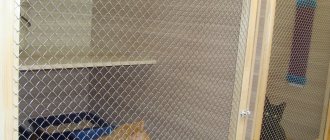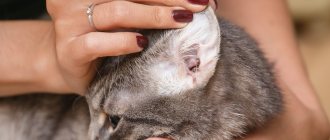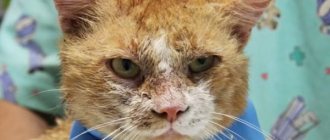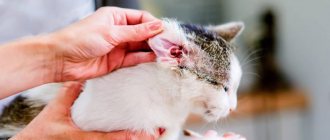Veterinarian tips for feeding cats
Veterinarian tips for caring for cats:
- Cats need to be fed meat, but not very fatty, dairy products. Meat should be given to cats raw, at least every other day, after scalding the piece with boiling water. With raw meat, cats receive the bioflavonoids necessary for their predatory body, which are needed for metabolic processes. Without raw meat, cats may get sick and lose their fur.
- These animals are big lovers of meat, such as: chicken, beef, veal, minced meat, chicken gizzards and necks and liver. All this can be fed to cats. Veterinarians recommend giving liver to cats 1-2 times a week, after pouring boiling water over it.
- If you feed your cat liver very often, it can lead to hypervitaminosis (excess of vitamins) A and D vitamins.
- Also, cereals and vegetables are very useful for cats, but not every cat will eat it. Therefore, study your pet to see which cereal or vegetable does not disgust him, and mix it into his food.
- If you managed to teach your cat to eat cereals and vegetables, then this is only a plus. You can cook different porridges, except for rolled oats (it contributes to disruption of carbohydrate metabolism in cats).
- You can also add vegetables to the porridge, both boiled and raw, simply grated. Raw vegetables, like raw meat, are also very necessary for the cat's body. Beans, tomatoes and eggplants are contraindicated for cats. Vegetables can be served with meat, without cereals.
- also needs to take special vitamins , they can be in the form of tablets, or place a pot of special grass next to the bowls, which contains all the vitamins necessary for cats.
- Be sure to remember to provide fresh, clean water .
- Cats can be given only 1-2 eggs per week, no more, as this destroys biotin, which is responsible for the health of the coat. Lack of biotin leads to hair loss.
- Nowadays, on store shelves we are offered a large assortment of dry ready-made cat food, but not all of them are healthy. Veterinarians recommend choosing food at a high or medium price; it contains a large percentage of meat and all the substances and vitamins necessary for the health of cats.
- Cheaper food does not contain meat at all; instead of animal protein, it uses vegetable soy protein, which can cause stones in cats.
Healthy nutrition is good for cats too.
Healthy diet
One of the main points of care is regular feeding of foods that are safe for cats and provide them with necessary substances and vitamins . Balancing the furry diet will ensure their health, activity, and long life.
One of the common mistakes of cat owners is an irresponsible attitude to their pet’s nutrition. Many people believe that it is enough to feed the animal human food from their table - and this leads to serious illnesses in the pet.
When preparing a cat's diet, you need to take into account the recommendations of veterinarians.
- Ready-made food should be combined with moist, nutritious cereals and herbs.
- We must not forget about the constant presence of water in the animal’s bowl.
- Wet and ready-made food should be chosen only from good brands, “elite” or “premium” class. Economy class meals can be used extremely rarely, in the absence of a better option.
- For the normal development of apartment cats, the presence of good quality meat and fish products in the diet .
- You can also feed your pet homemade products - boiled lean meat, fish, nutritious cereals, fermented milk products, vegetables (raw and boiled). By percentage, protein should be present most in the diet.
The healthiest foods that cats definitely need are lean meat, offal, buckwheat or barley porridge, sea fish fillet, vegetables such as zucchini and carrots. Eggs should also be given.
What should you not feed your cat? What do veterinarians advise not to give to cats?
Not everything can be fed to a cat; many foods are very dangerous. Let's look at the list of these products.
Veterinarian tips for caring for cats:
- Many people think that fish is a cat's favorite treat, but this is not true. Fish is harmful to them; it contains a lot of protein, which increases the load on the animal’s kidneys, thereby destroying the mineral balance, after which urolithiasis begins.
- Feeding cats only fish will cause a deficiency of vitamin K, which will lead to poor blood clotting. In addition, the fish may be infected with parasites. Therefore, if you decide to pamper your pet with fish, choose sea fish and feed it once a week, maximum twice.
- You should not give cats flour products and legumes, they cause flatulence in the animal and intestinal upset.
- You can't feed cats pork; it's too fatty for them. Fatty foods cause obesity of internal organs in cats, and pork meat can also contain parasites.
- You also shouldn’t let the food you give your cat have any seasonings.
- Make sure that cats do not get to indoor plants, as they can be poisonous.
Veterinarians advise not to feed cats everything.
Maine Coon
History of the origin of the breed:
The history of the Maine Coon breed began in the territory of Maine (North America), the climate there is humid, which obviously led to the cats acquiring thick and dense hair, as well as a chic tail and a powerful, strong body. For a long time they protected people's supplies from rodents, for which farmers highly valued these cats, and many people fell in love with them. There are a large number of different versions of the origin of this breed, they say that it is a mixture of a cat and a raccoon, and they say that cats and lynxes, in fact, scientists still cannot solve this riddle.
Description of character and life expectancy:
The serious and gloomy appearance of this breed prepares you to be wary of them in advance, but in fact it is not such an unkind and wild predator, it knows how to be a gentle and loving cat. Beneath the gloomy and menacing skin of the Maine Coon lies the kind and sweet soul of a little kitten. These giants are not at all selfish or withdrawn; nevertheless, they love loneliness and solitude, and get along well with other animals and children. The lifespan of a Coon is from 15 to 20 years; the oldest Maine Coon cat lived 23 years.
Grooming, hygiene and diet:
Caring for Kun's luxurious fur coat will require a lot of work and effort. To keep your fur always in order, the following devices will be useful to you:
- Brush with natural bristles;
- Wide-toothed comb;
- Fine-tooth comb;
- Comb with teeth of different lengths;
- Comb with frequent small teeth.
Maine Coons should be combed 2-3 times a week, starting with a wide-toothed comb, after which you have gotten all the hairballs out of the coat; if the tangles are too tangled, you can move on to a fine-toothed comb. When you are finished untangling the tangles, go over it with a wool brush with natural bristles. When choosing combs, make sure that the material from which they are made is not plastic or metal, because... the wool will become electrified. It’s better to take wooden ones, or if you still opt for metal ones, be careful that there is a plastic ball at the end of each clove that will not allow you to scratch the animal’s skin. Every day you need to wipe the eyes with a cotton pad to remove natural secretions; you need to cut the claws once every 2-3 weeks with the help of a veterinarian. The animal's ears should be cleaned once every 1-1.5 weeks. Since the Maine Coon is a rather large breed, cats eat a lot, and keeping in mind that the cat itself is a predator, it is worth paying more attention to meat; the diet of an adult Maine Coon is feeding 4-6 times a day.
This is what the correct diet for a Maine Coon looks like:
- Meat and offal;
- Bones;
- Fish;
- Eggs;
- Milk;
- Low-fat: Cottage cheese, kefir, fermented baked milk;
- Buckwheat or rice porridge with water.
How to accustom a cat to a new home: advice from a veterinarian
Veterinarian tips for caring for cats:
- If you cannot imagine life without a pet and decide to get yourself a pet, then veterinarians advise adopting an animal at the age of 10-12 weeks. At this age, the pet begins to get used to the person.
- When you bring your furry pet into your home, the bag or basket in which the animal was brought does not need to be removed immediately. Place it in a corner until the cat adapts to the new place, it will be a refuge for it, the cat will use it more than once. Place the necessary vessels in a place visible to your pet - a bowl for food and water, a tray where the cat will go to the toilet.
- Food bowls should be made of materials that are easy to clean, and the litter tray should be spacious, 5-10 centimeters high. For convenience, the bottom of the tray can be filled with special granules - fillers, sawdust or torn paper. This kind of filler is easy to replace, but it’s better not to use sand; throwing it down the toilet can clog the pipes in your house.
- With the advent of a new home, the cat may behave very warily, hide in a corner or, on the contrary, sniff everything. At such a moment, the animal experiences great stress; a person must help the pet survive this stage. At such a moment, the person himself should be calm, not scream, not behave aggressively while the pet gets used to the new place.
- Try to spend a few days as much time as possible with the new family member, pay more attention to him and then the adaptation period will end much faster.
For a cat to be happy, you just need to love it.
What does a kitten need first?
There are a number of items that you should acquire before you bring a kitten into your home. First of all, this is, of course, the cat's litter box.
cat litter
A regular tray is a closed or open plastic container with high edges, filled with special compounds. At the genetic level, cats feel the need to bury traces of their vital activity, so they are attracted to loose litter on their own. In addition, living in a confined space, cats tend to go to the toilet in the same place, especially if this place is cleaned regularly.
Sand of various sizes, absorbent granules and sawdust are used as filler. What should you choose? It is better to choose experimentally. For animals, as a rule, there is not much difference. However, owners of long-haired cats are not recommended to use sawdust - it remains on the fur.
Today, automatic trays filled with absorbent granules are also sold. Although it would be more correct to call them semi-automatic, because human participation in their work is still necessary. However, they eliminate the need to react to every animal’s trip to the toilet, which is especially valuable for lazy owners and squeamish cats, or if you have to go on long business trips and there is no one to take care of the cat.
Elena, felinologist: “In most cases, there are no problems with litter box training. When you bring a kitten home, you can immediately put it in the tray, the path will become familiar. Even if he goes to the toilet somewhere else, just put the tray in that place, and the next time he goes to the tray. After the cat goes to the toilet several times, the tray can be moved step by step, moving from point to point, to the right place - the animal will go into it.”
Kitten in an open plastic tray
Bowl
Any dish from which it will be convenient for the animal to eat and drink is suitable as a cutie. These can be saucers, enamel bowls, purchased plastic feeders. Of course, they need to be washed regularly. The degree of regularity depends on the circumstances, but no one has ever gotten worse from maintaining hygiene.
Today, automatic feeders and drinkers are available on the market. This can be convenient for developing the cat's habit of eating at the right time. It also helps with gluttonous animals that are always begging you for food and get offended if you don’t give it. This is also convenient for those, again, who are forced to be away for a long time and have no one to leave the cat with - an automatic feeder will allow the animal to wait out your absence without any problems, especially when combined with an automatic tray.
Kitten drinks from a bowl
House and scratching post
Cats feel safe by “hiding” in boxes, under blankets, in closets - they need some kind of enclosed space. So a cat house out of a box is almost an ideal option.
Today, entire “playgrounds” with a house, places for climbing and grinding claws are sold. Alas, practice shows that cats prefer to climb cabinets and sharpen their claws on carpets and furniture. So it’s more practical to organize a box of rags in a cozy place and a separate scratching post.
Elena, felinologist: “I know from personal experience that all these jokes about cats and boxes are not jokes at all. Cats really love boxes, so if you want to give your pet a personal space, put something in the box and that’s it, wait. Although my cat gets along just fine without a house at all, she prefers to be covered with something and sleeps peacefully in this state. And as a scratching post, it’s most convenient to take a small board, simply rewind it with thick twine, securing its edges with small nails, and nail this structure to the wall at a level convenient for the cat, again, with nails.
You need to accustom a cat to a scratching post from childhood - when he sharpens his claws somewhere, you need to stop him, explain that this is wrong, you can lightly click him on the nose, then take him to your scratching post, move his paws along it, simulating sharpening his claws, and pet the animal, walk it and pet it. This will create a positive connection.”
The cat looks out of his house
Hygiene items
Cats need to have their nails trimmed. So you will need a nail clipper. There are, of course, special devices, but manicure nail clippers are perfect for this role.
Animals also need to brush their fur, so you will need a brush. The choice of accessory depends on the length of your animal's fur and, more importantly, its individual preferences, so there is no definite solution. You have to try.
For bathing, you will need regular towels and a special shampoo, the choice of which, again, depends on your budget and the characteristics of the animal. To clean your ears, which with normal health and a home lifestyle requires no more than once a month, ordinary swabs with cotton swabs, which you probably use to clean your ears yourself, are suitable. Some owners also brush their cats' teeth - this procedure is also not carried out more than once a month, and to carry it out you will need a special toothbrush and toothpaste. We will look at hygiene issues in more detail below.
Cat toys
Elena, felinologist: “Anything that is not nailed to the floor and can be moved by the efforts of a furry ugly creature is suitable as a toy. Kittens are ready to play with everything that rolls on the floor, including your socks, slippers and anything that fell on the floor from the table, for example. You can make toys for them yourself - balls made from tightly rolled plastic bags are excellent. Can be purchased at pet stores. It is better not to take anything with feathers - the feathers will definitely be eaten. It’s also better not to leave anything unnecessary on the floor.”
A kitten uses a scratching post on which toys are hung
Carrying
You will definitely need a container to transport the animal, for example, to the veterinarian or for a walk to get some fresh air. For these purposes, it is best to use ready-made carriers, which you can find in a sufficient assortment at your nearest pet store.
Some people carry cats in a backpack or bag, but keep in mind that the animal needs oxygen and light, and on the way it will most likely be very nervous, so when calling the cat’s “meow” you need to look at the pet, pet it and something speak in a soothing tone.
How to accustom a cat to your house: advice from a veterinarian
Cats need to be raised with love and care, like small children, and therefore, keeping them requires a lot of effort and adaptations to ensure that your pet can feel comfortable in the home. Let's take a closer look at them.
Cat house . The cat needs to be taught to go to the toilet and eat in strictly designated places, but it is important that the pet has its own corner for sleeping and resting. There are special houses for cats and cats that greatly simplify keeping such pets in the house. With the appearance of a cat house in your apartment, your nights will be calmer, without a cat on your pillow, it will be easy for you to find him in the apartment. A cat may not immediately start living in a house, since the cat family is very conservative, they need time to get used to it.
Veterinarian tips for caring for cats:
- Size. A house for a pet must be selected according to size; if it is too large or small, the pet may refuse to spend time in it.
- Smell. A new home shouldn't smell like glue or the cheap material it's made from. Animals have a keener sense of smell than humans. If the house smells strongly, your pet will refuse to live in it.
- House upholstery. Take a closer look at your pet, what material does it lie on most often at home, maybe it’s your terry robe or shirt. The most common material is carpet or plush; it is soft and does not electrify. If your pet has some kind of favorite bedding, then you can put it in his house, so he will get used to it faster.
- The place where the house will stand. This should be a quiet and secluded place, not on the aisle. Cats love to be near a radiator, so the house can be installed near a heating device; you should not place it too close, as overheating will cause the animal to shed.
- Sustainability . The pet's home must be carefully secured. Cats are afraid of structures that shake. Once scared, your furry friend will never go there again.
- Special conditions. Males are cats, they are protectors and must monitor the situation around them; their house should have several tiers. Females prefer to take care of their offspring, so they prefer closed, cozy homes.
- Functionality . Cats not only love comfort, but also show great interest in various designs. You can add tiers, a scratching post, or attach some kind of toy that your pet will enjoy playing with.
Praise your pet when he spends time in the house, give him treats, pet him. Cats love affection and they are very smart, affection and love are very important to them. This attitude towards the animal will quickly help it adapt to its new home and to you.
How to accustom a kitten to a litter tray, read the article: How to accustom a kitten and an adult cat to a litter tray or toilet?
Give a cat a home and you will see a look that will never betray you.
Maintaining Health
A kitten is a living creature that can get sick, so it is important to know how to support its immunity. It is advisable to visit a veterinarian who will tell you about the first symptoms of diseases and poisonings, draw up a vaccination schedule, and recommend means and methods of combating fleas, ticks and other parasites.
Vaccinations
You should not refuse vaccinations, even if the kitten is indoors and does not go outside. Animals are vaccinated against the following diseases:
- panleukopenia (feline distemper);
- rabies;
- infectious peritonitis;
- viral rhinotracheitis (feline herpes);
- feline viral leukemia.
They use polyvalent compounds that protect against several diseases at once. Revaccination is carried out after 21 days. The pet must be kept in quarantine conditions, since immunity is developed only 14 days after vaccination.
According to the plan, vaccination is carried out for one-year-old kittens, then annually. All data on vaccinations performed is entered into the animal’s veterinary passport. They indicate not only the date of vaccination, but also the series, number, and name of the drug.
The first vaccination does not include protection against rabies; this vaccine is administered separately, the same applies to the lichen vaccine. The rabies vaccine causes depression in the pet, it becomes lethargic. If the cat does not come into contact with other animals and does not go outside, it is best to vaccinate against rabies at the age of 6-8 months, then annually, at approximately the same time.
There are vaccines for other, rarer diseases. Vaccination is carried out at the request of the animal owner. Vaccination is carried out only for a healthy pet who plays vigorously, eats well and does not have a high temperature. Before vaccination, the veterinarian must examine the baby.
- what vaccinations are given to kittens and at what age;
- how to play with a domestic cat;
- sleeping place for a cat.
Fighting internal parasites
10 days before the planned vaccination, the pet is given drugs against helminthiasis. Then the procedure is carried out every quarter. The smallest kittens (2-3 months old) are dewormed for roundworms, which babies could become infected with through their mother's milk. Use Pyrantel, Piperazine.
For older pets, use drops on the withers, which have a wide spectrum of action - Advocate, Stronghold. For round and tapeworms use Profender.
Tablets against parasitic worms are also used: Drontal, Milbemax, Prazicide, Kanikquantel. If the cat flatly refuses pills, use drugs in the form of suspensions.
Removal of ectoparasites
Fleas on pets should also be eliminated as quickly as possible. Insects that parasitize the skin cause itching, allergies, dermatitis and hair loss. In addition, fleas are carriers of worms.
Various remedies are used for fleas:
- drops on the withers, protecting against fleas and ticks for a period of 2 to 4 months (Stronghold, Inspector, Lawyer);
- sprays that treat all animal fur;
- repellent collars that protect against flea infestation on your pet’s coat;
- antiparasitic shampoos.
Each of the means has its own advantages and disadvantages:
- Shampoos (Biovax, Celandine, Bio-Groom, Lugovoy, Degtyarny) are quite cheap and effectively eliminate fleas, but not every kitten can be accustomed to water treatments.
- The drops have a long-lasting and effective effect, but it is not advisable to use them for wounds on the skin. The drops are highly toxic; to prevent your pet from licking them, you must wear a protective collar around the neck.
- Collars do not kill fleas, they only repel them. Low cost is a good advantage.
- Sprays are quickly consumed, but at the same time effectively repel ectoparasites.
Flea and tick products should be used strictly according to the instructions. For babies, buy more gentle products (for example, shampoos for kittens) or apply them in smaller quantities (drops on the withers).
Also watch the video on how to care for a kitten:
How to accustom a cat to a scratching post: advice from a veterinarian
Veterinarian tips for caring for cats:
- If your cat begins to damage the furniture and it’s too late to trim its claws, then you urgently need to buy your pet a scratching post. First, you need to observe what place the pet began to spoil.
- If it is a jamb or a wall with wallpaper, then it is better to buy a scratching post with a carpet corner. Place it in the place where the cat began to scratch. At first, a cat may accept such equipment aggressively, but there are a few tricks that will help you accustom your pet to a scratching post.
- First, you need to pick up the pet, bring it to the scratching post and place its paw on it, then lightly press the paw so that the cat releases its claws, and move the paw from top to bottom. This trick needs to be done several times, maybe not in a row, but over the course of a day or several days.
- Secondly, they now sell special sprays for this method, mostly mint-based. You just need to spray the scratching post. Veterinarians advise not to use valerian, it is a drug for cats.
- For more information on this topic, read the article The cat is tearing up furniture: what to do? How to stop a cat from tearing up furniture: practical advice and radical methods .
Get your cat used to scratching posts from an early age.
Domestic cats also often undergo nail trimming.
It is necessary to accustom your pet to trimming its claws from a young age, gradually introducing it to this procedure, at first only by touching its claws during communication, then gradually adding a nail clipper or blister. If your animal has not been accustomed to the procedure of trimming its claws since childhood, then trimming its claws will be quite difficult, and almost impossible for one person, without putting the pet into a stressful state and without injuring the pet. In this case, the best solution would be to contact a veterinary clinic or grooming salon.
If you do do this yourself, make sure the cat is in a supportive mood, pet it, then gently restrain the animal with the help of an assistant and, pressing on the pad of the paw, expose the claws. Using special safety pliers or blisters (available in pet stores), trim the claws. Do not cut too short; you must leave a few millimeters to the “living” claw. Do not use blunt instruments or regular nail scissors. At the end of circumcision, the claw is processed with a nail file at the cut site.
Grooming: veterinarian advice
Veterinarian tips for caring for cats:
- Taking care of their fur plays a very important role in the health of cats. These animals are very clean; they lick their fur very carefully. Sometimes such efforts are not enough and therefore veterinarians strongly recommend helping cats in this matter.
- Combs and brushes, which can be purchased at a pet store, will help you care for your animal's fur. Try to examine your cats as often as possible to immediately identify any disease or parasites.
- Brushing your cats will make life easier not only for them, but also for you. The fur you comb out could end up on the sofa or on the floor throughout the apartment. When a cat licks itself, it eats its fur to get rid of this lump, the cat begins to cough, causing vomiting. This is normal.
- If the cat has short hair, then you need to comb it twice a week, and if the cat has long hair, then once a day, so that the hair does not roll up, otherwise you will have to remove this lump only with scissors. Try to brush your cats gently so as not to damage the skin.
A well-groomed coat is the key to a healthy cat.
More details on this topic in the article: The cat, the cat climbs a lot, loses hair all year round: the reason, the time of shedding. What to do, what to feed, what to give to a cat and a cat, how to care for a cat and a cat so that their hair does not come out?
You can't train a kitten to play with your hands
But sometimes you really want to tinker with this lump while it’s lying on your lap! Let him bite himself to his heart's content, tear him with his claws... After all, they are still so small, not sharp, and his paws are soft. And it doesn't hurt you at all. That's it for now!
The kitten will grow up very quickly. You won’t even notice how his fangs will become large and sharp, like sabers, and his claws will become prickly, like a cactus. And when he wants to bite you a little and tear you with his claws, even just a little, it will no longer be cute fun. Or even worse - it will start hunting your unfortunate hands! What did you expect? This is a predator! It will be difficult to wean a cat from this habit.
From the very beginning, when you brought the kitten home, play with it with anything, but not with your hands. So that he does not have such associations later. Use different toys, do not draw attention to your hands.
You can't train a kitten to play with your hands
Bathing cats
Veterinarian tips for caring for cats:
- In the wild, cats don't bathe unless it rains. The cat needs to be washed as it gets dirty. Of course, if a cat got into something, got dirty, and smells bad, then it needs to take a bath as soon as possible, and with antibacterial shampoo specially made for cats.
- If your cat has fleas, you need to wash it with flea shampoo. If the cat takes care of itself, washes itself, washes itself, then it is not necessary to bathe it every day. In cats and kittens, a film forms on the body, which has a protective function for the body.
- If you bathe your cat frequently, the film will begin to wash off, so it is better to bathe cats once every two weeks. For a pet that walks outside and comes into the house to spend the night, it is better to simply wash its paws and dry them with a towel that you have specially allocated for it.
- If you decide to give your cat a good bath in the bathroom, you should first plug his ears with cotton wool to prevent water from getting into them.
- If water gets into your pet's ears, he may develop a disease called otitis media. And also, make sure that the cat does not drink soapy water from the bath, this can cause stomach upset and poisoning.
- More details on this topic in the article: Do cats need to be bathed, and how often? How to properly wash domestic cats, cats and kittens and with what?
Bathe cats as they become dirty.
Pet scratching post
Under natural conditions, representatives of the cat family wear down their claws when climbing trees. A cat living in an apartment needs a scratching post. It will help protect furniture and wallpaper from damage and avoid ingrown claws. The devices vary:
- manufacturing materials - cardboard, wood, sisal, jute, carpet;
- shape - column, cone, shelf;
- mounting method - floor and wall;
- sizes.
Thanks to the variety of models, each owner can choose a suitable scratching post - one that is suitable in price and size, and will fit into the interior of an apartment or house. It is better to give preference to natural, durable materials - wood, sisal, jute. The device must stand firmly on the floor or be well secured to the wall. If you purchase a gaming complex, you will not have to buy a scratching post separately.
Cat sterilization
Veterinarian tips for caring for cats:
- Neutering a cat means removing the ovaries. Cats can not only be spayed, but also neutered, removing all reproductive organs.
- A cat’s sexual desire can be suppressed with special drops or tablets, but they are hormonal and can harm the cat.
- Your cat needs to be spayed when she is 8 months old. Before surgery, it is better not to feed the animal for 5-6 hours, as veterinarians advise. It takes a long time for cats to recover from anesthesia, about a day.
- If after two days the cat is lethargic and has no appetite, then it is better to call a veterinarian at home. Do not forget to treat the seam; if it begins to ooze, then lubricate it with brilliant green or fucorcin.
- If your cat scratches or licks a stitch, distract her from doing so. A cat's sexual desire can last up to several weeks while sex hormones circulate through the body.
- Read more on this topic in the articles: Favorable period for sterilization of a cat and castration of a cat. Preparing a cat for sterilization and methods of sterilization, care after sterilization. Is it worth spaying a cat and neutering a male cat? What complications can there be?
We are responsible for those we have tamed.
Controlling new additions to the cat family
Veterinarians around the world have long recommended castration or sterilization as an almost mandatory procedure. The technology of these surgical interventions has already been well developed and does not pose a threat to the life and health of the animal.
Among “professional” cat owners, it is customary to leave uncastrated only those animals that are planned to be used to produce offspring.
If you don’t dream about kittens, as well as about the monthly (and for cats, even monthly, with every heat!) screams, fragrant puddles left by the cat in all possible places, and attempts to run away from home in search of a “other half” - better follow this advice!
And the lack of sexual activity for an uncastrated animal can result in health problems! Neutered cats and sterile female cats are usually more affectionate and more attached to their owners, but they are prone to a sedentary lifestyle: to avoid obesity, these cats need special care - you need to play with them regularly and not overfeed them!
Castration or sterilization should be carried out when the animal is already physiologically formed, but there is no pronounced sexual behavior yet, or it has just begun to appear: between the ages of one and three years.
At the same time, it is possible to castrate a cat even if he has already mated with cats - this is not dangerous for his health, but it is undesirable to sterilize a cat that has given birth (even a young one)!
In general, sterilization is a more complex surgical intervention than castration, and is more difficult for animals to tolerate.
The risk of belated castration, rather, is expressed in the fact that if the cat is unable to reproduce, all the “charms” of male behavior will remain - he will continue to mark the territory, “knead” your blankets with his clawed paws, yell when the thaw comes, etc.
This happens because when the external genitalia are removed, the production of testosterone in the body does not stop completely, and the cat may well “shake off the old days” (this is especially true for the operation of ligation of the seminiferous tubules - during this procedure the testicles are not removed, and the hormonal background of the animal does not change, it even able to mate without producing offspring).
If it is already too late to castrate the animal (or it is planned to obtain offspring from it in the future, but at the moment “March behavior” is very inappropriate), you can influence this problem with hormonal drugs (such as “Antisex”).
As you understand, this will not solve the problem forever, and the pills do not have a guaranteed contraceptive effect, but the owners are guaranteed a couple of weeks of peace of mind! But long-term regular use of these drugs can cause health problems in both cats and females, so this is not the optimal option for caring for an adult cat, but an “ambulance” in rare cases!
And one more piece of advice on how to care for a cat: love her and don’t be shy to show it. Talk to her, take her in your arms, sometimes spoil her with something delicious!
A cat is like a child: it is very dependent on the mood of the owner and his attitude towards her. There are cases when a cat got sick or even died, when it seemed to her that her owner had abandoned her and stopped loving her!
Cats feel human weakness, pain, grief and are able to relieve them! So don't they deserve reciprocal love?!
—— Author – Dasha Blinova, website www.sympaty.net – Beautiful and Successful
Castration of cats
Veterinarian tips for caring for cats:
- Veterinarians advise castrating an animal at 9-10 months. If castrated earlier, the animal may develop problems with the urethra. It is necessary to castrate before the first mating.
- If you operate on the cat later, it will not help; after the operation, he will still want the cat. Because the sex hormone in cats is also produced by the pituitary gland and, if mating has already taken place, then the sex hormone will not escape from the cat’s body.
- After the operation, take good care of the cat, do not let him lick the stitch, put on a special circle so that he does not reach it. Let him drink more regular fresh water.
- Feed him food that is easy to digest; heavy food after surgery and lack of water in the cat's body can cause urolithiasis and obesity. Such procedures are done at the request of the animal’s owners; if you want offspring, you don’t have to do it.
Not only dogs are man's best friend, but cats too.
Toilet (model, filler)
You need to take the choice of a toilet seriously, because if the cat doesn’t like it, she will refuse to go in it. A tray with low sides and a double bottom is the cheapest and most compact option. It does not involve the use of litter, so it must be removed after each cat’s visit to the toilet, otherwise an unpleasant odor will appear.
Cat diseases: advice from a veterinarian
All cats are susceptible to various diseases and infections, and it doesn’t really matter if they are indoor cats or go for walks outside. There are diseases that only affect cats, and others that are dangerous to humans. Such diseases are transmitted through close contact between an animal and a person. Let's look at what diseases are common in cats and humans.
Veterinarian tips for caring for cats:
- Rabies. This is a viral disease that can affect all animals, and therefore humans can also become infected with this disease. An animal can become infected from an infectious animal, or from a rodent that is a carrier of the disease. Signs of rabies include: refusal to eat, cats are afraid of light and water, their salivation increases, and they have become more aggressive. Basically, the virus in cats is in the mouth, and therefore it can be transmitted to humans from the bite of a pet. To prevent such a disease in an animal, it is necessary to undergo annual vaccination.
- Ringworm . This disease is fungal and therefore the causative agents of this disease are fungi. This is a skin disease that is characterized by peeling and redness of the dermis and in the animal. Mostly it happens on the head or on the front legs. At the first signs of illness, you must immediately take the animal to the veterinarian, get tested, and then follow the exact treatment prescribed by the veterinarian. The animal's recovery can last up to a month.
- Parasites. There are external and internal parasites. External parasites cause great discomfort to cats; they begin to itch frequently and severely. Such parasites are mainly found on the neck and stomach of the animal. They pose a great danger; through their bites they infect the animal with internal parasites - worms. Therefore, to begin with, veterinarians recommend removing external parasites; this can be done using special bathing products, and then begin removing worms. Just don’t delay treatment, this disease can be fatal for the animal. Read more in the articles: Worms in cats: causes, symptoms, treatment, prevention. What blood-sucking insects and parasites can live on a cat's body?
The list of diseases that cats can suffer from is very long. Some can be noticed immediately, but some can occur in a hidden form. Therefore, do not forget to take your cat for vaccination, inspect her fur more often, and generally take a closer look at her. If you suddenly notice something wrong, it is better to immediately contact a specialist. Don't be afraid to make furry friends, just follow some rules for keeping and caring for them and they will shower you with love.
Take care of animals, because for them you are the whole world.
How to keep your cat healthy?
Basic recommendations to keep your pet healthy:
- A balanced diet that provides it with nutrients, vitamins and microelements necessary for the normal functioning of all organs and systems.
- Weight control. Excess body weight leads to the development of endocrine and cardiovascular diseases and reduces life expectancy.
- Regular examinations by a veterinarian to ensure early detection of health problems.
- Vaccination. Helps protect the animal from dangerous infectious diseases.
- Deworming (prevention of parasite infection and treatment of helminthic infestation).
- Physical exercise. Allows you to stay in good shape and maintain a normal weight.
- Security. Danger comes from open windows, wires, toxic substances, and poisonous plants.
- No stress. They can be caused by a change of environment, the departure of the owner, the appearance of a child or another pet in the family, or loneliness.
- Proper care.
Kitten adaptation
The optimal age to adopt a kitten is 3 months. His immune system has already strengthened, his intelligence is developing, and his appearance is also visible.
How to make your baby accept your home as his own? Be prepared to help him with this for the first 3-4 weeks.
On the first day the kitten is in the house, limit its space to one room. Let him look around, sniff, and only then introduce him to the rest of the territory.
Playing with a kitten
Kittens develop better in games; they perceive their playmate as their friend, so don’t be lazy to spend 15-30 minutes every day playing with your baby. Some kittens are even better trained after this. Kids who were played with as children are more cheerful than kids who were not paid attention to.
Friendship with a dog or another adult cat
First, the animals need to be introduced. The advantage of a kitten is that it smells like childhood and an adult animal will sooner or later accept it anyway. During the first meeting, avoid direct contact. Lock the animals in different rooms, and then switch places. This way they will get used to each other's smells.
Afterwards, arrange a “confrontation” again. If there is no conflict, then consider that friendship will definitely happen.
Kitten and child
A child who is too young may inadvertently hurt the kitten. Therefore, contact should take place under the supervision of an adult. Older children need to be explained the rules of playing with a kitten. By the way, the latter must also feel the limits of what is permissible.
Read: The best cat breeds for a family with a child.
Conan the Barbarian or Destroyer Kitten
“A cat knows how to purr himself and forgive himself for anything.” However, the destruction that the baby causes is not small at all. To prevent damage, you can cover the furniture with double-sided adhesive tape, place valuable items at a height inaccessible to the baby, and remove flowers and photo frames higher up.
Limit the kitten's passage to hard-to-reach places and, as an alternative to trimming the claws, put special tips on the claws.
Walking outside with a cat
How to care for a dachshund: keeping it at home
Representatives of the cat world who live in an apartment do not need daily walks as badly as dogs do. Walking in the fresh air will have a beneficial effect on the health of your pet.
For your information! A regular dog leash is not suitable for cats. For these purposes, you need to purchase a special harness. The cervical muscle corset in cats is not as well developed as in dogs.
Walking with a cat outside is only possible with a harness.
The leash should be attached not to the collar, but to the harness. It consists of two straps that are attached to the chest.


